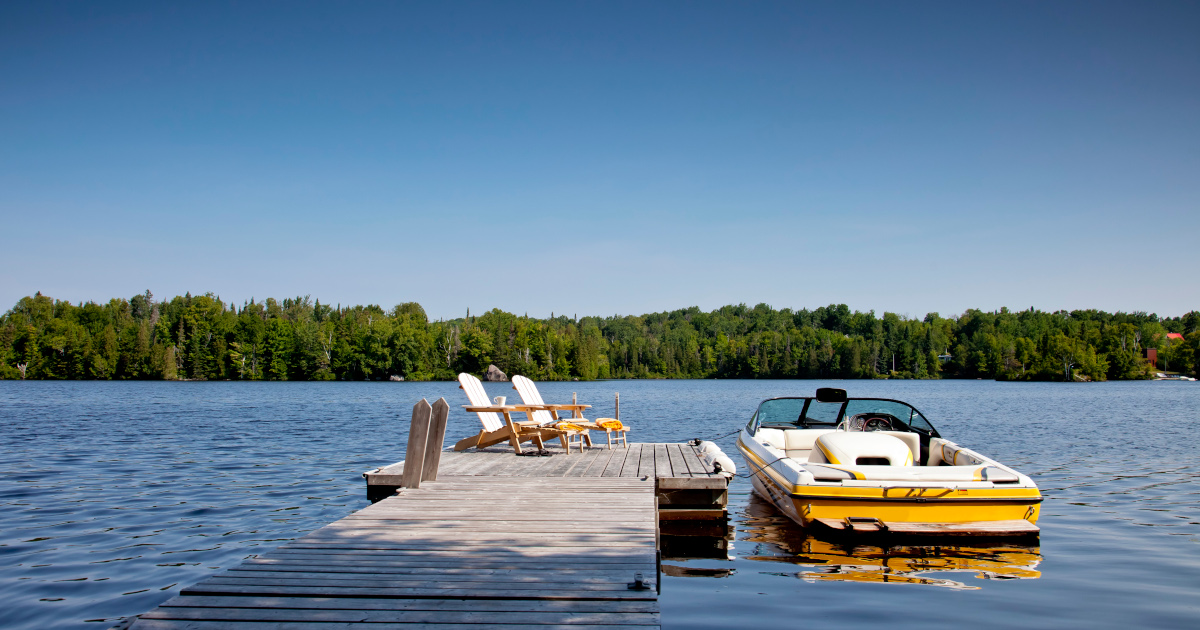
Aug. 30, 2022 - A plat map that reserved three lake access lots for the use of other lot owners created an easement and did not convey title, the Wisconsin Court of Appeals has ruled.
In Kapinus v. Nartowicz, 2021AP1027 (June 3, 2022) the Court of Appeals District IV held that because the plat granted the other lot owners an easement, they were not riparian owners and were not entitled to install and maintain a pier on one of the lake access lots.
Three Lake Access Lots
A plat recorded on June 3, 1911, laid out 30 residential lots and three narrow lots – named A, B, and C – that provide access to Lake Waubesa in Dane County.
 Jeff M. Brown is a legal writer for the State Bar of Wisconsin, Madison. He can be reached by
email or by phone at (608) 250-6126.
Jeff M. Brown is a legal writer for the State Bar of Wisconsin, Madison. He can be reached by
email or by phone at (608) 250-6126.
Seventeen of the 30 residential lots are riparian lots that front the lake; the other 13 lots do not front the lake and are not riparian lots.
According to the 1911 plat, “Lots A, B, and C are reserved for the use of lot owners in this plat only, including boat house and pier privileges for said owners.”
Jack Kapinus took title to a riparian lot immediately to the north of lake access lot B in 2018. Kapinus’ lot was separated from lake access lot B by a three-foot-wide strip of land, which Kapinus acquired in 2019, making his riparian lot adjacent to lake access lot B.
Dispute Over Pier
Since 1983, Joseph Nartowicz and his family have installed and used a pier at the shoreline of lake access lot B. The pier extended beyond the northern boundary of lake access lot B and into the riparian zone of Kapnius’ lot.
In May 2020, Kapinus filed a complaint in Dane County Circuit Court, alleging that the Nartowicz pier constituted a private nuisance, a public nuisance, and a public trespass. Kapinus also sought a declaratory judgment.
Kapinus moved for summary judgment. He argued that it was unlawful for Nartowicz to install a pier on lake access lot B because Nartowicz did not meet the six requirements that must be met before non-riparian owners may install a pier under Wis. Stat. section 30.131.
One of those requirements is that the riparian owner must have granted, prior to Dec. 31, 1986, a written easement authorizing access to the shore to a non-riparian owner.
Nartowicz did not dispute that he could not meet the requirements of section 30.131. Rather, he argued that the reservation wording in the plat dedicated the lake access lots to owners of all 30 lots in the plat and, in effect, transferred fee title to them such that each had the right to install and maintain piers at the shorelines of the three lake access lots.
Kapinus argued that the reservation wording in the plat created no more than an easement interest in the lake access lots.
The circuit granted Kapinus’ motion for summary judgment, and Nartowicz appealed.
Intent in Plat is Unambiguous
Writing for a three-judge panel, Judge JoAnne Kloppenburg concluded that the reservation wording in the plat unambiguously indicated an intent to convey the non-riparian lot owners an easement.
The words “reserved,” “the use of,” and “privileges” “echoes the language that Wisconsin courts have used to describe the rights conveyed via easement, namely, ‘a right of use or privilege in the land of another,’” Kloppenburg wrote.
Such an interpretation was consistent with the interpretation of similar wording that applied to similar circumstances in other cases decided by Wisconsin courts, Judge Kloppenburg pointed out.
For instance, in Stoesser v. Shore Drive P’Ship, 172 Wis. 2d 660, 494 N.W.2d 204 (1993), a deed specified that parties “reserve for themselves …. the use of the channel” while “reserving for themselves … the right … to use the lake shore.”
“These similarities, together with the court’s conclusion in Stoesser that the deed conveyed a right of access and certain specified riparian rights by an easement, confirm our interpretation of the plat notation,” Judge Kloppenburg wrote.
No to Nartowicz’s Arguments
If the drafter of the plat intended to convey fee title to all the lot owners instead of only an easement interest, Kloppenburg reasoned, the second part of the wording (“including …pier privileges for said lot owners”) would be redundant, because conveying fee title to all the lot owners would make them all riparian owners.
“There would have been no need to single out the ‘privilege[]’ of maintaining a pier if the drafter intended to convey all rights of riparian ownership by making each lot owner an owner of the lake access lots,” Judge Kloppenburg wrote.
Nartowicz argued that by using the word “reserved,” the plot conveyed ownership in the three lake access lots by dedicating them under a 1911 state statute
But many of the cases cited by Nartowicz in support of that argument were from other jurisdictions, Kloppenburg pointed out. And, she noted, the Wisconsin cases cited by Nartowicz did not involve private dedications of land to individuals.
“Nartowicz fails to provide any relevant and persuasive legal authority to support the argument that the word ‘reserve’ here is evidence of an intent to convey by dedication title to the lake access lots to all of the low owners within the plat,” Judge Kloppenburg wrote.
